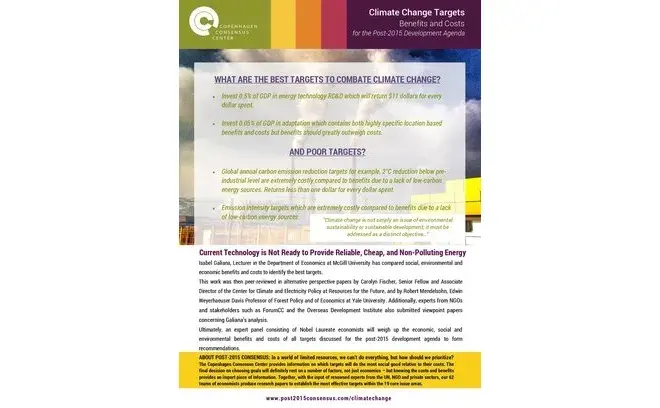Climate Change
Within climate change, the targets that have the best benefit-cost ratio are:
- Invest 0.5% of GDP in energy technology RD&D which will return $11 dollars for every dollar spent. In contrast to emission reduction targets, this approach allows nations to continue to develop economically until cost-effective low-carbon technologies become available. It will be necessary to use this in conjunction with incentives (intensity targets/ standards, carbon pricing) to encourage the adoption of technologies when they become available.
- Invest 0.05% of GDP in adaptation which contains both highly specific location based benefits and costs, but benefits should greatly outweigh costs. This approach will be essential for the hardest hit areas, allowing for both damage prevention and continued economic development.
The analysis shows that the following targets are relatively ineffective or there is large uncertainty in the benefit-cost ratio:
- Global annual carbon emission reduction targets which are extremely costly compared to benefits due to a lack of low-carbon energy sources. Returns less than one dollar for every dollar spent.
- Emission intensity targets which are extremely costly compared to benefits due to a lack of low-carbon energy sources.
Scroll down to read our series of reports examining climate change targets for the post-2015 development agenda, written by leading economists and experts.
Assessment Paper
Isabel Galiana, Lecturer at McGill University assesses the costs and benefits of several climate change targets. She argues that the failure of the international community to implement and achieve emission reduction targets is not through lack of political will, but rather because current technology is not advanced enough to provide reliable, cheap energy for the needs of modern society.
Her paper shows that the best target to tackle climate change is to invest 0.5% of GDP in green energy research and development, which will return $11 per dollar spent. A target to keep temperatures at 2°C below pre-industrial levels has lower benefits than costs.
Generally, the failure of international climate agreements, for example the Kyoto Protocol, is attributed to strong incentives to free-ride and ineffective compliance mechanisms and sanctions. This fails to acknowledge the fundamental nature of the climate change problem: the energy technology problem.
-Isabel Galiana
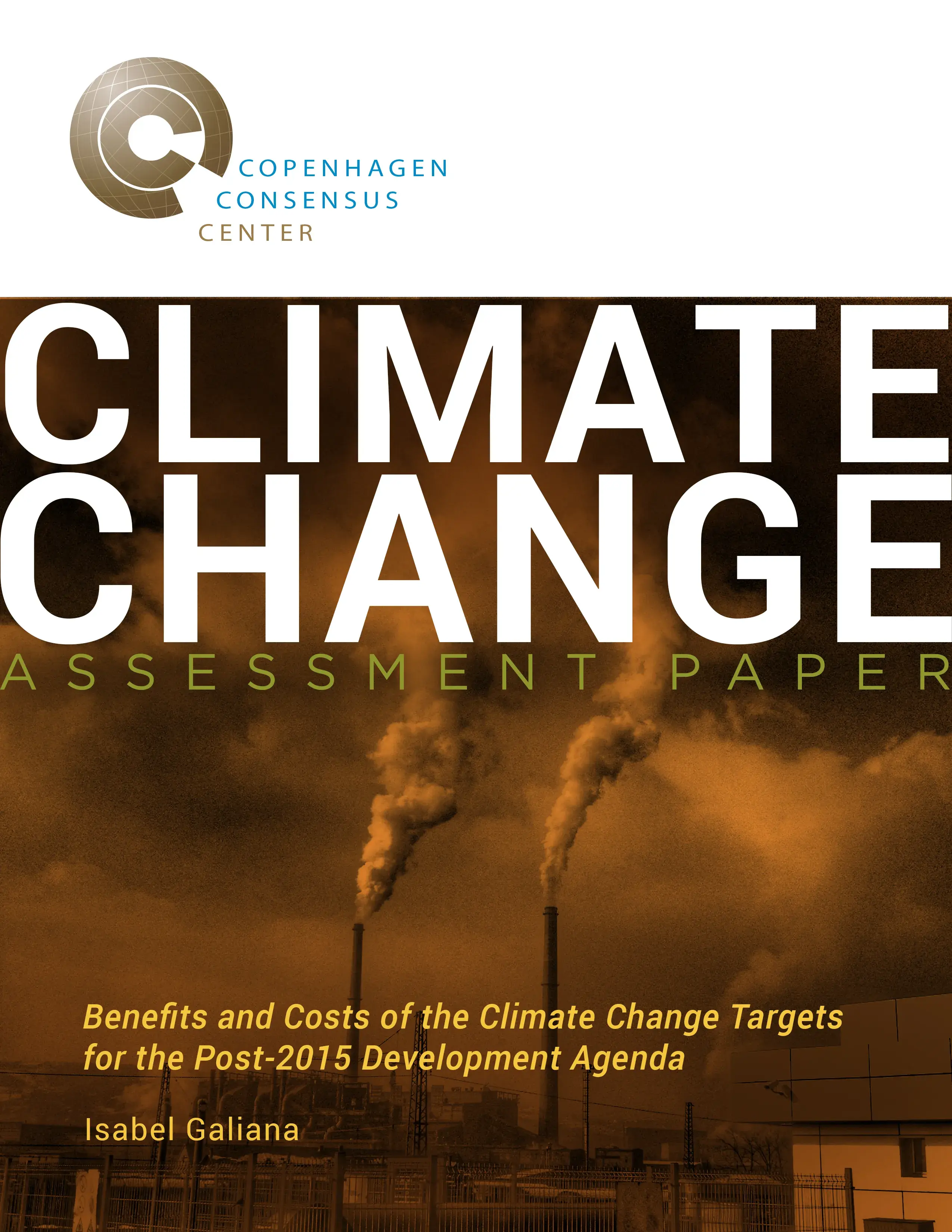
Perspective Paper
Carolyn Fischer, Senior Fellow at Resources for the Future, agrees with Galiana that there should be greater focus on investment in energy RD&D. However, she also stresses the need to price carbon to better align social costs of fossil fuels with their market prices. This would be a better way to encourage innovation and activities required to reduce emissions, as opposed to pure RD&D strategy. Furthermore, Fischer argues that cost-benefit models for climate change (so-called integrated assessment models) may not adequately capture all the costs of warming, and cannot address the distributional impacts of climate change.
…it is difficult to avoid making emissions pricing a central piece of mitigation policy. Technology policies use only a subset of abatement options in the toolkit, whereas carbon pricing encourages all options, including improving energy efficiency, reducing the emissions intensity of fossil-based energy, and creating and adopting innovative low-carbon technologies.”
-Carolyn Fischer
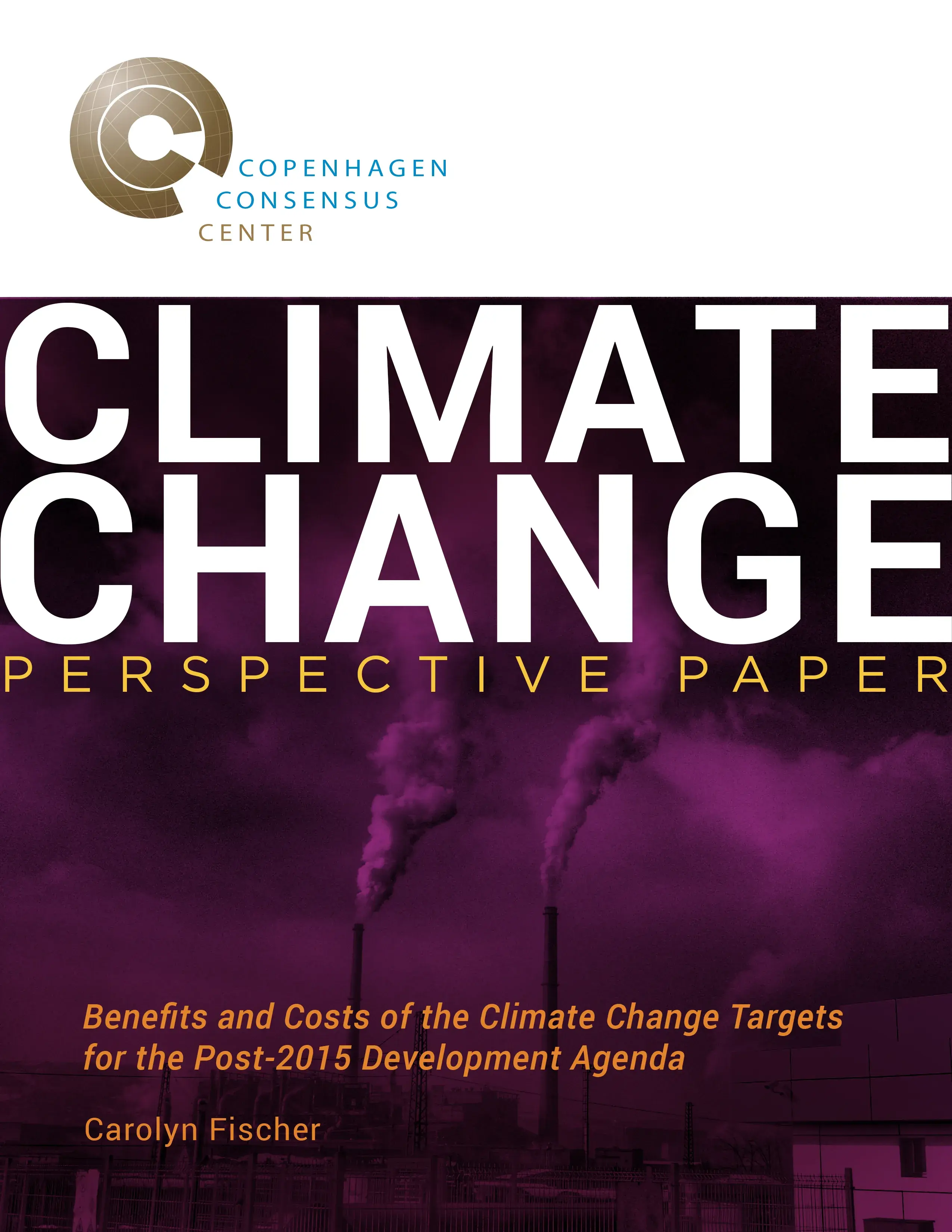
Perspective Paper
Robert Mendelsohn, Professor of Economics, and Professor of Forest Policy, at Yale argues that the UN’s current target of 2°C represents an unnecessarily demanding and costly mitigation target, that encourages nations to delay action to combat climate change. Instead, he argues a better strategy would be to commit to a less stringent but achievable target that would prevent the worst climate change damage, while at the same time invest in adaptation strategies.
Recommendation: start with a modest climate goal that can actually be achieved. Hold warming to 4°C and begin immediately to meet this target. This target has relatively low costs so that it will not bankrupt countries nor prevent economic growth.”
- Robert Mendelsohn
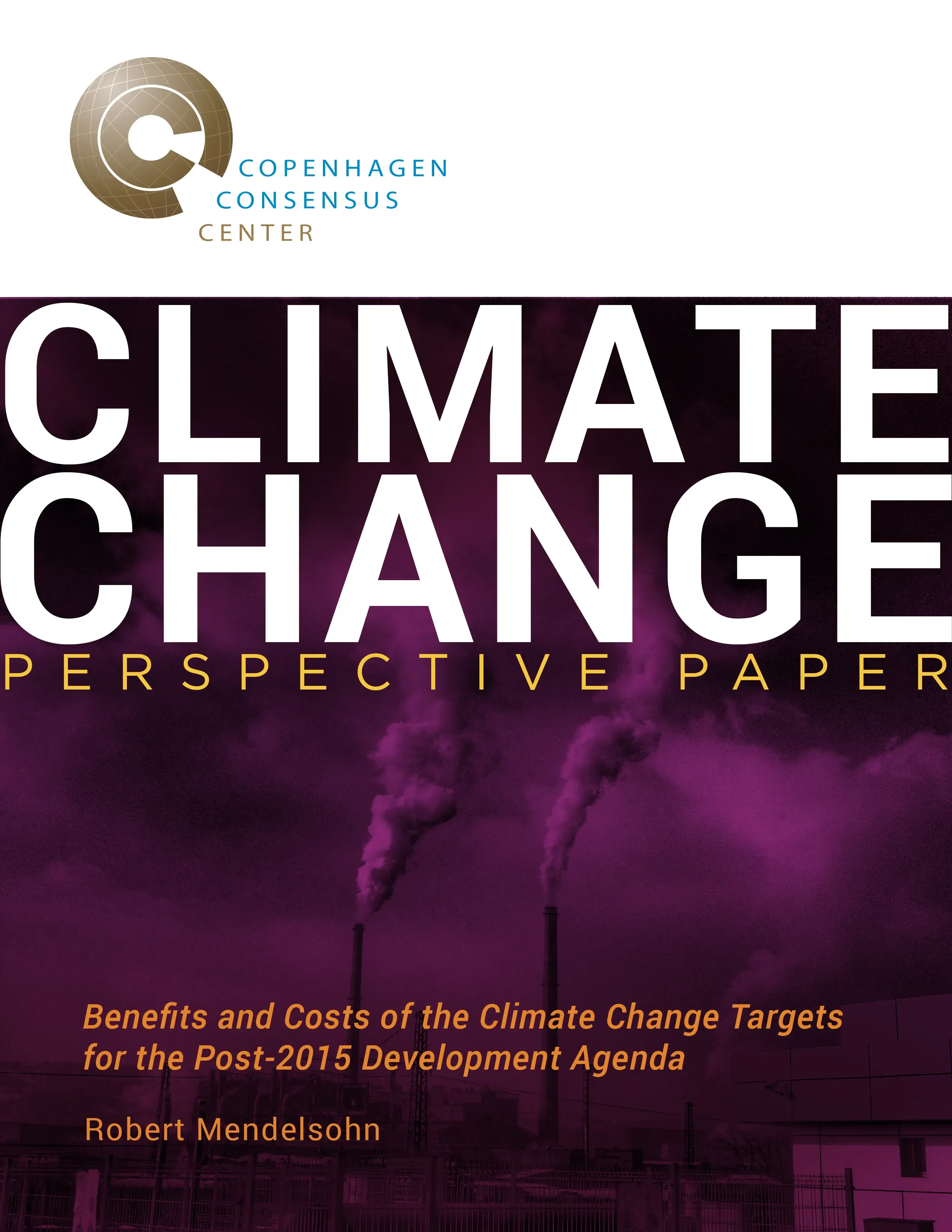
Viewpoint Paper
The viewpoint of ForumCC applauds the assessment paper by Isabel Galiana for providing strong evidence-based arguments, especially on climate change mitigation. However, ForumCC points out a number of weaknesses within the argument. A better inclusion of issues such as adaptation, climate finance and loss and damage, which are very important especially to developing countries, could strengthen the analysis.
Climate change is a complex, cross-sectoral, global development challenge, and despite having effects on all countries, the level of impact is different among and between countries - and this can be mainly due to adaptive capacity, which is always associated with (but not limited to) the level of development.”
-ForumCC
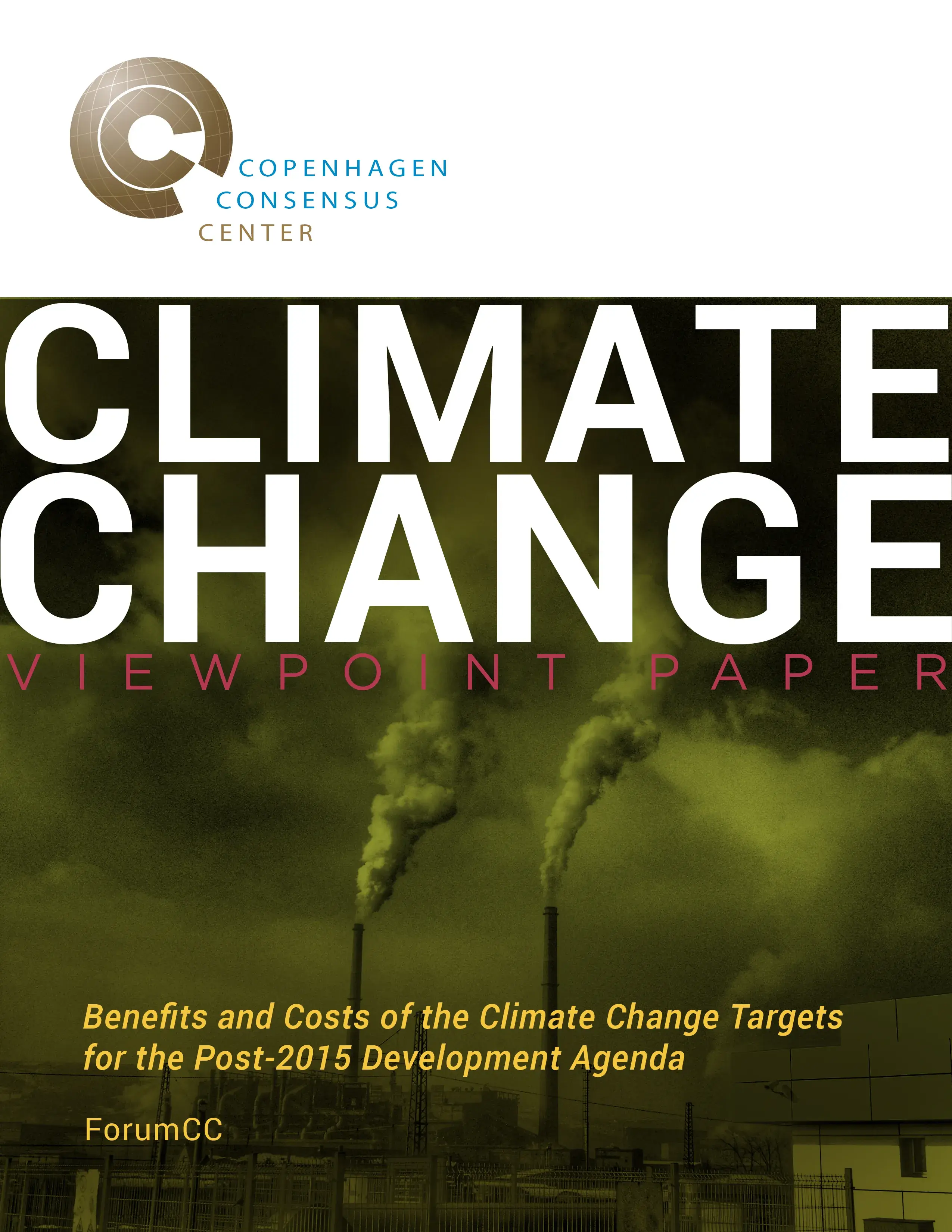
Viewpoint Paper
The viewpoint paper by Lucy Scott, Research Officer at the Overseas Development Institute gives a brief background of how the UN has addressed climate change in the past. Contending that a focus should be adapted to how exactly climate change can be incorporated into international development. Scott highlights three areas of targets which could better incorporate climate change into the post-2015 development agenda that could be particularly beneficial for developing governments.
The question is therefore no longer if, but how, climate change is to be incorporated into the international development agenda."
- Lucy Scott
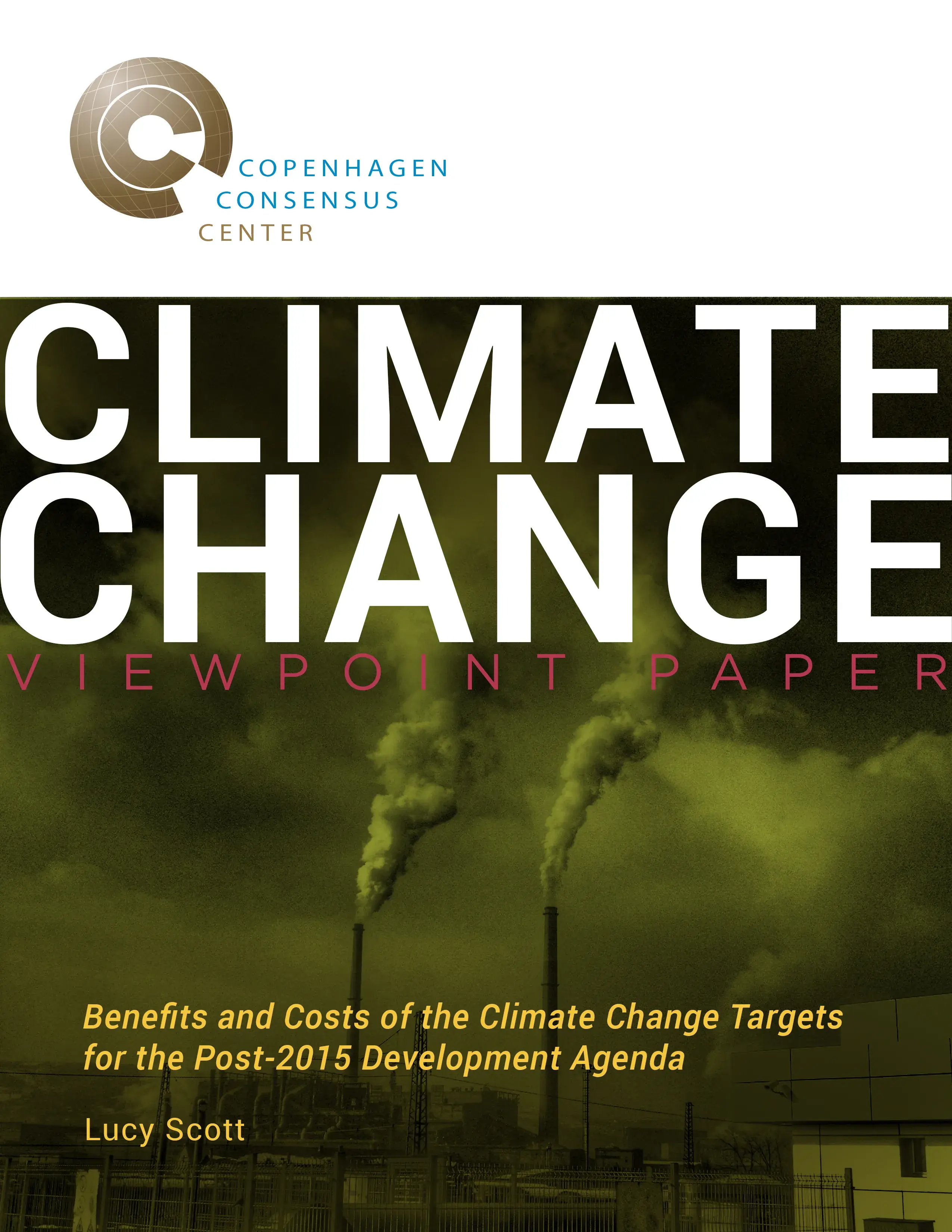
The Post-2015 Consensus project brings together 60 teams of economists with NGOs, international agencies and businesses to identify the targets with the greatest benefit-to-cost ratio for the UN's post-2015 development goals




